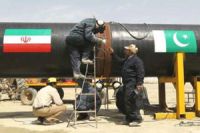Pakistan resolved to complete IP gas pipeline

The Charge D’Affaries of Pakistan’s Embassy to Tehran, Soheil Seddiqi, has reported on the indomitable resolve of Pakistani government to complete the pipeline for transference of Iran’s natural gas to Pakistan, which is also referred to as IP pipeline.
According to IRIB World Service, in an interview with IRNA on Sunday, the Pakistani official emphasized on the unflinching determination of the Pakistani government to expand cooperation with Iran, especially in the economic and commercial sectors.
He underlined that Pakistan faces shortage of energy and to meet this need it is determined to complete the IP pipeline, despite all pressures and unilateral sanctions.
This pipeline’s section in Iran has been completed, and after the completion of this project in Pakistan’s soil, the transference of natural gas to Pakistan will commence.







